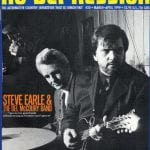Donald Lindley: 1951 to 1999
Donald Lindley, longtime drummer for Lucinda Williams, Rosie Flores, Dave Alvin, Joe Ely and many others, died of lung cancer in Austin on February 3. His frequent bandmate Duane Jarvis wrote the following remembrance of the man a couple days after Lindley’s passing.
February 3 was “the day the music died” — the day an airplane crash claimed the lives of Buddy Holly, Ritchie Valens and the Big Bopper in 1959. On February 3, 1999, I lost my “big brother,” Donald Lindley. Kathi lost a husband, Jesse Brian lost his father. We have all lost a wonderful friend and musician, a vital creative force, one that will never be paralleled.
Many a brilliant singer-songwriter would not have grooved so gloriously if not for this man. Donald provided the pulse on many great records, including Lucinda Williams’ Car Wheels On A Gravel Road, Dave Alvin’s King Of California, Rosie Flores’ Dance Hall Dreams, Julie Miller’s Blue Pony, Buddy Miller’s Poison Love, Marvin Etzioni’s Bone and Jim Lauderdale’s Pretty Close To The Truth, to name a few.
I learned a lot about friendship and about music from Donald. An amazingly well-rounded musician, Donald was a walking rock ‘n’ roll encyclopedia. I think Buddy Miller said it best, and most affectionately: “Donald knows every crappy song.” The underlying meaning is that he knew every great song too, from Wynonie Harris to Mott The Hoople to Hank Williams.
I first met Donald in the mid-’80s in Los Angeles. Marvin Etzioni had just left Lone Justice and I met him at a music store. Through more naivete than nerve, I informed him that I should be the guitar player in his new band. At the rehearsal hall, I met this drummer Donald. I was very green, a bit shaky. I plugged in, played the riff from the Meters classic “Chicken Strut”, and Donald fell right in. It was a great “Hi-my-name-is” moment.
From that day on, Donald was a big booster of mine and introduced me to his friends, among them Rosie, Lucinda, Greg Leisz and Pete Anderson. It was Marvin who gave him the entirely appropriate nickname “The Clock” because of his amazing pulse and wondrous groove.
When “The Clock” sat down at the kit, everyone focused. In the recording studio, if anyone could inspire a great track, it was Donald. Had he just played passionately, brilliantly and inventively, it would have been enough. The truth is, he brought us and the music to another place.
In these somewhat shabby fashion times, Donald always arrived dressed for the gig. Recently Brad Fordham and I picked him up on the way to a benefit for Rod Hebert of KFAN in Fredericksburg, Texas. Donald walks out the front door in some wild striped trousers, a shimmery bright shirt and some whacked cool shades. Very rock ‘n’ roll, and classic Lindley. A big film noir enthusiast, he knew just when to drop the perfect deadpan hard-boiled detective quote to either underscore a point or to crack you up beyond belief. What’s the saying about sizing someone up not by their social standing in the world, but by their ability to laugh? Donald would laugh and bring us all to the party.
I’m lucky to have had Donald as a very close friend and musical partner-in-crime, from smoky dive bars to full concert stages and every imaginable venue inbetween. We drove through the Alps. We shared rides in beat-up cars, driving out to Pappy & Harriet’s in the California desert, windows down, air conditioner broken. He was always there for me, his family and his friends, intensely loyal, generous and thoughtful. I knew I could always call him anytime. I’ll miss his voice on the answering machine: “Little brother, it’s Donald…”
I know a lot of people, but not many I could hold close. Wherever you are, save me a place next to you on the bandstand. You burned so brightly my friend. I love you. Good night, big brother.




